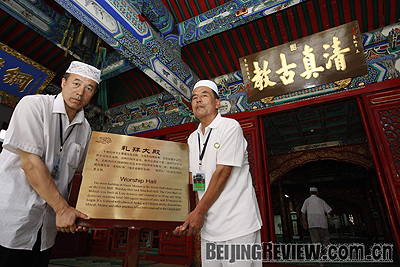|
 |
|
UNIVERSAL APPEAL: Staff of Niujie Mosque install a bilingual plate with information about the building, on July 24 (CFP) |
In the past, when foreigners wrote memoirs about their experiences in China, they tended to use confusing public signs and humorously translated menus to prove the vast cultural difference.
Some extreme examples would have been scary if they weren't so entertaining, such as the dish called "husband and wife lung slice," offered by many restaurants. It was in fact a bad translation of beef and ox tripe in chili sauce. Another popular dish, mapo tofu, was sometimes translated as "bean curd made by pock-marked woman."
Still more problematic for foreign visitors was the lack of English signs. Without reading Mandarin, finding their way around the city and understanding the menus in most restaurants were tough tasks. Even the help of friendly locals was difficult to understand because of the language barrier.
The municipal government launched the Beijing Speaks Foreign Languages Program (BSFLP) in 2002, which has been dedicated to raising the English level of Beijing residents and improving the translation of public signs and menus. The official website of the program's office says that it will take advantage of the increasing enthusiasm of Beijing residents for studying and speaking foreign languages before the Olympics to raise the level of English, which is necessary for Beijing to become a truly metropolitan city.
The main activities organized by the program include setting up the Beijing English Testing System, a three-level English certification system that is open to all Beijing citizens; organizing veteran translators to draft the standard version of all public signs and menus of Chinese dishes; organizing weekly English corners around the city, twice-a-year English festivals in parks, English competitions and lectures on skills for learning English.
The standard translation of public signs by BSFLP was released in December 2006, covering five types of public place, including medical institutions, traffic facilities, tourism spots, sports venues and shopping places. Related municipal government branches, such as medical authorities, traffic bureaus, tourism bureaus, sports bureaus and bureaus of commerce were given the responsibility to make sure standard bilingual signs are put up in the facilities and venues they administrate.
Standard English translations of 2,300 Chinese dishes, which have been compiled into a book, were distributed to star-rated restaurants, official reception hotels for the Olympics and some tourism agencies in June.
Emergency language services
In July, the Administration for Industry and Commerce of Xuanwu District, home to the Niujie Mosque, the oldest mosque in Beijing, posted complaint hotline numbers in local shops, in Chinese, English and Arabic. The administration has also set up three counters in the area to receive consumer complaints, with Arabic and English interpreters.
"Menus and signs are less entertaining than they used to be," said Erin Conway-Smith, a Canadian news editor who has been working in Beijing for three years.
Tourists who come to Beijing during the Olympics will have the luxury of assistance from an army of volunteers offering translation services.
Between July 1 and October 8, up to 550 volunteers' booths located around Olympic venues, shopping centers and most popular tourist attractions will be in operation. The major responsibilities of the volunteers dressed in blue are city traffic assistance, Olympic information consultation, emergency medical rescue and translation services for foreigners.
In August, the month of the Olympics, some booths around key Olympic facilities, such as the Olympic Village and Main Media Center, and others near tourist attractions, will work around the clock.
Shichahai, or Houhai, a man-made lake situated in downtown Beijing, is a must-see place for tourists due to its beautiful scenery and well-preserved hutongs (small lanes). During the Olympics, two volunteers' booths south of the lake, which began operating on July 1, will work 24 hours a day.
Li Yuanbo, a sophomore student majoring in public administration, has been working at one booth since its inception. Speaking fluent English and basic Korean, his major responsibility is translation. In the first 25 days of his tenure, he has been asked to write notes in Chinese to show taxi drivers or waitresses, guide foreigners to the nearest restaurant, point out the closest Starbucks. He has even been called on to translate negotiations between a Chinese and a foreign driver after their cars hit each other.
Li expects to give more guidance on the best residences and lanes to visit, using a bilingual map for Shichahai. Among dozens of tourist attractions in this area, he said he would strongly recommend Beihai Park, the Mansion of Prince Gong and Dajinsi Hutong. "I think what Chinese people like will also be liked by foreigners and I want to recommend places with strong Chinese characteristics," he said.
When Li and his colleagues are approached by a tourist who speaks neither English nor Chinese, they phone the Olympic call center on 9602008, which provides translation and information services in nine languages. | 
